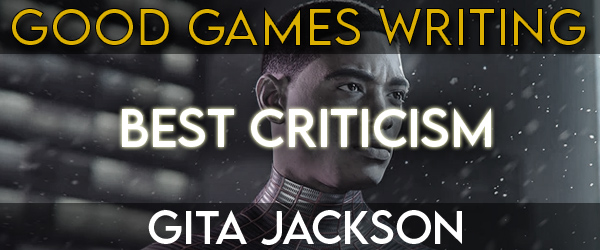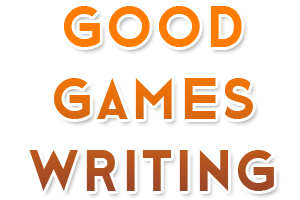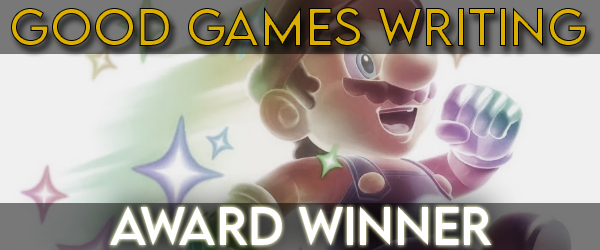Our final day of awards presentations kicks off with one of our two most competitive categories.
CRITICISM
This category embodies any work that applies a critical lens towards gaming. Essays, reviews, thinkpieces, and more are covered here. Our definition of crit is broad and varied.
Dia Lacina’s essay on how the original Animal Crossing starts you off as an outsider in a world that exists independent of the player, and how subsequent games change that with increased player agency, is certainly criticism.
So, too, is Haru Nicol’s application of film techniques paired with a broader discussion of the context of the political messaging in Ghost of Tsushima and its muse Akira Kurosawa.
Ewan Wilson argues we don’t need need videogames to show us visions of an apocalyptic future: It’s already around us. The notion of “ruin lust”, the process of documenting the decay of modern architecture and urban decay, is explored through references to photographers covering the scene and games like Night in the Woods that lean into a “contemporary Gothic” motif.
At Vice, Austin Walker tackles Watch Dogs: Legion, its approach to constructing a crew (“Play As Anyone”!), and its stumbles in landing a coherent message that fits either within Ubisoft’s own past of saying games aren’t political or in the context of 2020 writ large:
How does one break a neighborhood free from “oppression”? Deface a few billboards. Sabotage a weapons factory. Knock out a really bad person. Complete three tasks like these in a district and you’ll unlock a special liberation mission, which are empty-calorie fun that somehow result in city-wide fireworks and celebration claiming that the neighborhood is now “defiant,” despite the fact that nothing has changed.
Fascism comes in many forms. Yussef Cole’s exploration of the changing face of fascism in Star Wars Squadrons challenges readers to consider the “recent departure and diversification for a previously homogeneously white Imperial military” while applying it to modern cases ranging from the backlash of there being a “black Stormtrooper” in The Force Awakens to Kamala Harris’ debate performance against Mike Pence, to say nothing of Harris’ own political legacy.
While the problematic nature of Black and brown folks proudly participating in an organization steeped in bold-faced fascism may be superficially self-evident, Squadrons also finds compelling ways to highlight and address it. Squadrons spends much of the Imperial side of the plot unraveling the warring ideologies duking it out within the remains of the Empire. At several points throughout the game, Kerrill’s group runs up against the calcified holdovers of the Empire’s past glory; old white men who look directly transplanted out of the late-’70s casting calls the original trilogy’s olive-suited bureaucrats were staffed from, down to their posh accents and thinning blond coifs.
At Can I Play That?, Courtney Craven’s PS5 review caught our attention for the detail in which it dives into the menus, controller, and system features. Elise Favis’ review of Spiritfarer zeroes in on the narrative focus around death and the game’s strong characterization.
Monti Velez, meanwhile, interrogates the JRPG tropes and mechanics that can be off-putting to some, though the nominated piece hits its stride when it considers Velez’s own story of coming to America as an immigrant and the lingering question of “is it going to happen today?”. In other words, is today the day I get deported? The comparison is deftly woven between the United States and the story of Hamako found in the game.
At RPS, Natalie Flores highlights the ways in which Latinas are depicted in media broadly and the FPS genre more specifically: Hypersexualized, crime-oriented, and with accents that don’t match the diversity of Latin America and the Caribbean.

‘Nuance’ is the word that comes to mind when our team consider Gita Jackson’s Spider-Man: Miles Morales review.
It’s nuanced in how it approaches the game’s mechanics:
On the whole, I found the combat to be almost perfectly balanced, a rare feat for any game. Every time I lost a fight, I knew it was because I hadn’t exploited the weaknesses I could have, didn’t dodge that bullet at the exact right moment
The review is nuanced in its understanding of New York as written by a resident:
The game is so devoted to it’s picture perfect material recreation of New York City that it neglects the emotional reality of the city.
Above all, though, Jackson’s nuance is most evident in the analysis of the world and where it disconnects from reality. Those disconnects exist everywhere from the gentrification of Harlem (in game) to the view of the NYPD to the game’s willingness to lay blame on supervillains while ignoring the malicious intent of city hall.; and yet, there is much to be celebrated, from the way the bodega is situated, to the inclusion of a deaf character, to being a story about grief. There’s far too much for us to lay out in one graf, so suffice to say Jackson’s lived experience permeates every aspect of the criticism, and the review is stronger for it at every turn.
We’ll leave you with this powerful bit of writing:
Miles Morales is a black man, and an avatar of black New York, but he hasn’t experienced the same New York that so many black people have. As fun as it is to be Miles, to be the geeky black superhero I have always wanted to exist, the game cannot reconcile the differences between its New York and the one I see outside my window. That failure would be understandable, but what is unforgivable is that it does not even make the attempt.

